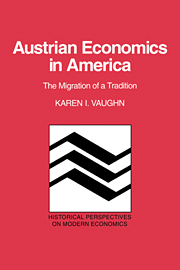Book contents
- Frontmatter
- Contents
- Preface
- Acknowledgments
- 1 Introduction
- 2 Carl Menger and the foundations of Austrian economics
- 3 Economic calculation and the rediscovery of Mengerian themes
- 4 Ludwig von Mises: Austrian economics in America
- 5 The Austrian revival
- 6 Defining the Austrian paradigm
- 7 Market process: the problem of order in Austrian economics
- 8 Austrian economics: which way forward?
- References
- Index
6 - Defining the Austrian paradigm
Published online by Cambridge University Press: 06 October 2009
- Frontmatter
- Contents
- Preface
- Acknowledgments
- 1 Introduction
- 2 Carl Menger and the foundations of Austrian economics
- 3 Economic calculation and the rediscovery of Mengerian themes
- 4 Ludwig von Mises: Austrian economics in America
- 5 The Austrian revival
- 6 Defining the Austrian paradigm
- 7 Market process: the problem of order in Austrian economics
- 8 Austrian economics: which way forward?
- References
- Index
Summary
If, in 1974, one had nothing but The Foundations of Modern Austrian Economics as one's guide to understanding the Austrian tradition, one might perhaps be forgiven for being greatly mystified by the claims made therein. It is not clear from that volume, for instance, why “action” is more useful a concept than “maximization” or why Mises' evenly rotating economy is a superior construct to Walras's general equilibrium. Why call economics “praxeology,” and why is it any better to refer to an individual's scale of values than to his preference function? Why is the concept of market clearing not made more precise by mathematical formulation rather than less so? For that matter, is mathematics not an aid to systematic thinking, and why, then, should economics want to do without it? And finally, why does it matter what the market process is as long as it is tending toward equilibrium anyway?
All these questions needed to be addressed within a systematic presentation of the Austrian view in the light of modern economic theory in order to sort out the vital issues from the peripheral, the insightful contributions from the pedestrian, but to do so was not easy. Mises spent his years in America isolated from the contemporary academic community and Rothbard apparently saw little to be gained from debate with those in the economics profession who were prone to disagree with him.
- Type
- Chapter
- Information
- Austrian Economics in AmericaThe Migration of a Tradition, pp. 112 - 138Publisher: Cambridge University PressPrint publication year: 1994

